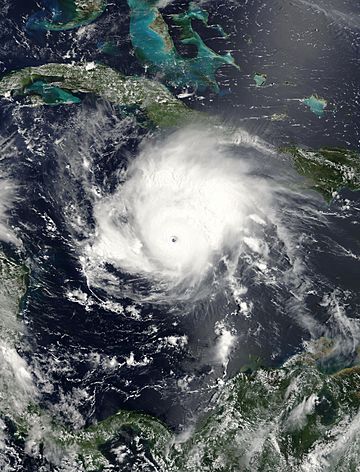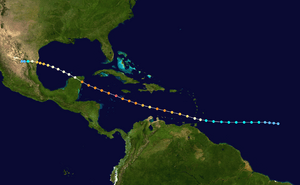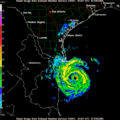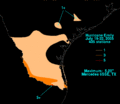Hurricane Emily (2005) facts for kids
| Category 5 major hurricane (SSHWS/NWS) | |

Hurricane Emily near its highest strength
|
|
| Formed | July 10, 2005 |
|---|---|
| Dissipated | July 21, 2005 |
| Highest winds | 1-minute sustained: 160 mph (260 km/h) |
| Lowest pressure | 929 mbar (hPa); 27.43 inHg |
| Fatalities | 6 direct, 9 indirect |
| Damage | $988 million (2005 USD) |
| Areas affected | Windward Islands, Jamaica, Honduras, Cayman Islands, Yucatán Peninsula, northeastern Mexico, and southern Texas |
| Part of the 2005 Atlantic hurricane season | |
Hurricane Emily was a very powerful storm that happened in July 2005. It was part of the 2005 Atlantic hurricane season. Emily was special because it was the only known Category 5 hurricane to form in July.
It even broke a record for being the strongest hurricane, just a few days after Hurricane Dennis had set a new record. Emily was also one of four Category 5 hurricanes during the busy 2005 season.
Hurricane Emily affected many places. These included the Windward Islands, Jamaica, Honduras, and the Cayman Islands. It also hit Mexico twice and the state of Texas in the United States. The storm caused about $988 million in damage. Sadly, 15 people lost their lives because of the hurricane. Even with all this impact, the name Emily was not retired. This means the name was used again for another storm in 2011.
Contents
How Hurricane Emily Formed and Moved
Hurricane Emily started as a tropical depression on July 10. A tropical depression is like a baby storm. The next day, it grew stronger and became a tropical storm named Emily.
The storm moved west, heading towards the Windward Islands. Tropical Storm Emily slowly, then quickly, gained more power. On July 14, it became a hurricane just before hitting Grenada. Its winds were blowing at 90 miles per hour.
After leaving Grenada, Emily got even stronger. It became a Category 2 hurricane, then a Category 3 soon after. Over the next day, Hurricane Emily's strength went up and down a bit. On July 16, it reached its strongest point. For a short time, it became a Category 5 hurricane with winds of 160 miles per hour!
After reaching its peak strength, Emily weakened slightly but stayed a very strong Category 4 hurricane. On July 18, Hurricane Emily made landfall in Cozumel and the Yucatan Peninsula in Mexico. It was still a Category 4 storm at this time.
The hurricane lost a lot of its power while moving over the Yucatan Peninsula. It entered the Gulf of Mexico as a weak Category 1 storm. As it crossed the Gulf, it slowly started to get stronger again. Emily didn't gain much more strength until it was about halfway to its next landfall.
On July 20, Hurricane Emily made its final landfall in Tamaulipas, Mexico. It was a Category 3 hurricane then. The storm finally died out the next day over Mexico.
Impact and Damages
Hurricane Emily caused a lot of damage, almost $1 billion worth. About 15 people died because of the storm. Most of the damage happened in Mexico, which was hit by Emily twice. The damage in Mexico was around $632 million.
In Texas, the damage was over $178 million. Even though Emily caused so much destruction, its name was not removed from the list of hurricane names in the spring of 2006. So, the name Emily was used again in 2011. Emily is one of only four Category 5 hurricanes whose name was not retired.
Related pages
|
Tropical cyclones of the 2005 Atlantic hurricane season |
|||||||||||||||||||||||||||||||||||||||||||||||
|
|
||||||||||||||||||||||||||||||||||||||||||||||
|
|
|||||||||||||||||||||||||||||||||||||||||||||||
Images for kids
-
Hurricane Emily, as seen by the US National Weather Service's NEXRAD in Brownsville, Texas at 03:07 UTC July 20. The storm's eye is clearly visible, surrounded by the strong storms of the eyewall. At imaging time, Emily was a Category 3 hurricane with 125 mph (205 km/h) winds, was moving west-northwest at 7 mph (11 km/h), and was roughly 100 miles (160 km) away from the location of landfall.
See also
 In Spanish: Huracán Emily para niños
In Spanish: Huracán Emily para niños
 | John T. Biggers |
 | Thomas Blackshear |
 | Mark Bradford |
 | Beverly Buchanan |







